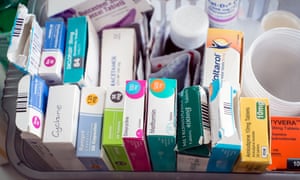Dublin warns medicine supply threatened by no-deal Brexit
More than half of Ireland’s medicines come from or are transited via the UK

The Irish government has said the country’s medicine supply will be threatened by a no-deal Brexit, with more than half of the 4,000 medicines marketed in Ireland coming from or transiting through the UK.
While Westminster lurched towards a widely expected defeat of Theresa May’s Brexit deal, the Irish cabinet was making critical decisions to cope with the potential catastrophic effects of no deal.
Ministers in Dublin heard that about 60-70% of medicines in Ireland came via the UK and the supply of some of these may be vulnerable if the UK crashes out of the EU.
These included medicines with a short shelf life, special storage and transportation requirements and those with single supplier reliance, the government said in a statement after the cabinet meeting.
The Department of Health said it did “not anticipate an immediate impact on medicine supplies” as there were additional supply stocks routinely built into the Irish supply chain. The government has also been planning a fast-tracking of essential drugs into Ireland to deal with “any delays and shortages”.
The update gives a glimpse of the scale of the impact of a no-deal Brexit on Ireland, with some predicting the impact could be even greater than in the UK.
The cabinet decided to push through a 17-part “omnibus” bill to “mitigate some of the most damaging effects of a no-deal Brexit”, covering trade, tax, health, jobs and policing and security.
The deputy prime minister, Simon Coveney, said: “A no-deal Brexit will have a significant impact on Ireland. These measures being taken by the government are designed to limit the damage. It remains our view that the only way to secure an orderly withdrawal is to ratify the withdrawal agreement.”
lisa o’carroll (@lisaocarroll)
NEW: While Westminster debate continues Irish cabinet has today agreed to put forward one omnibus bill to speed no deal contingencies laws through. The 17 part bill will address everything from health to tax and justice. See screen grab pic.twitter.com/z5EUj6CFel
Ireland’s prime minister, Leo Varadkar, announced in December that he was stepping up no-deal contingency planning, and over Christmas a special cabinet meeting agreed that it would get updates from two government departments in mid-January.
Ministers were also briefed on Tuesday on the transport risks posed by the reliance on Britain as a “landbridge” to France, with the majority of freight destined for the continent going via Dublin-Holyhead and Dover-Calais roll-on roll-off transportation.
About €21bn (£18.69bn) trade would be affected by any new barriers in Holyhead and Dover, most of it time-sensitive produce such as meat and dairy products.
The cabinet was told that preliminary assessments suggested there would be enough capacity on ferries, including a new super ferry operating from Dublin, to reach the continent via sea rather than road.
